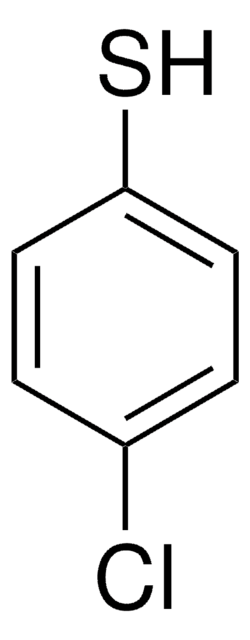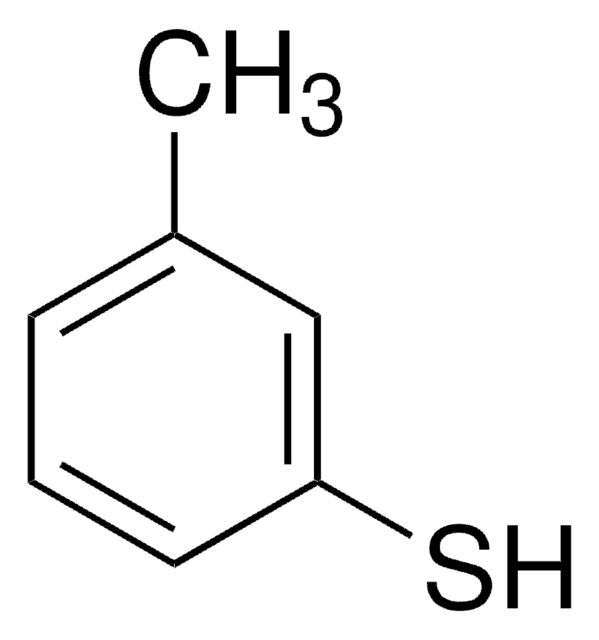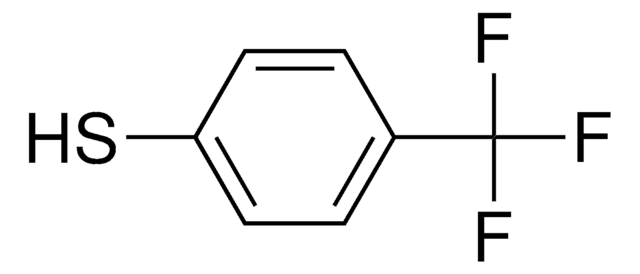T32808
Thiophenol
97%
Synonym(s):
Benzenethiol, Phenyl mercaptan
About This Item
Recommended Products
vapor density
3.8 (vs air)
Quality Level
vapor pressure
1.4 mmHg ( 20 °C)
Assay
97%
refractive index
n20/D 1.588 (lit.)
bp
169 °C (lit.)
mp
−15 °C (lit.)
density
1.073 g/mL at 25 °C (lit.)
SMILES string
Sc1ccccc1
InChI
1S/C6H6S/c7-6-4-2-1-3-5-6/h1-5,7H
InChI key
RMVRSNDYEFQCLF-UHFFFAOYSA-N
Looking for similar products? Visit Product Comparison Guide
Related Categories
General description
Application
- Asymmetric Michael addition to diisopropyl maleate in the presence of a catalytic amount of cinchonine to form (s)-(−)-diisopropyl phenylthiosuccinate, which can be further converted to (R)-(+)-3,4-epoxy-1-butanol.
- Regioselective and stereoselective 1,4-addition to alkenylidenecyclopropanes leading to endo- or cis-vinyl sulfide adducts, a key step in the synthesis of karahanaenone.
- Diastereoselective addition to (S)-N-(α,β-unsaturated carbonyl)-γ-[(trityloxy)methyl]-γ-butyrolactams to form the corresponding β-(phenylthio)carboxylates.
Signal Word
Danger
Hazard Statements
Precautionary Statements
Hazard Classifications
Acute Tox. 1 Inhalation - Acute Tox. 2 Dermal - Acute Tox. 2 Oral - Aquatic Acute 1 - Aquatic Chronic 1 - Eye Dam. 1 - Flam. Liq. 3 - Repr. 2 - Skin Irrit. 2
Storage Class Code
3 - Flammable liquids
WGK
WGK 3
Flash Point(F)
122.0 °F - closed cup
Flash Point(C)
50 °C - closed cup
Personal Protective Equipment
Certificates of Analysis (COA)
Search for Certificates of Analysis (COA) by entering the products Lot/Batch Number. Lot and Batch Numbers can be found on a product’s label following the words ‘Lot’ or ‘Batch’.
Already Own This Product?
Find documentation for the products that you have recently purchased in the Document Library.
Customers Also Viewed
Articles
Markovnikov and anti-Markovnikov alkene reactivity differences are discussed, highlighting challenges and catalytic advancements.
Markovnikov and anti-Markovnikov alkene reactivity differences are discussed, highlighting challenges and catalytic advancements.
Markovnikov and anti-Markovnikov alkene reactivity differences are discussed, highlighting challenges and catalytic advancements.
Markovnikov and anti-Markovnikov alkene reactivity differences are discussed, highlighting challenges and catalytic advancements.
Our team of scientists has experience in all areas of research including Life Science, Material Science, Chemical Synthesis, Chromatography, Analytical and many others.
Contact Technical Service

















